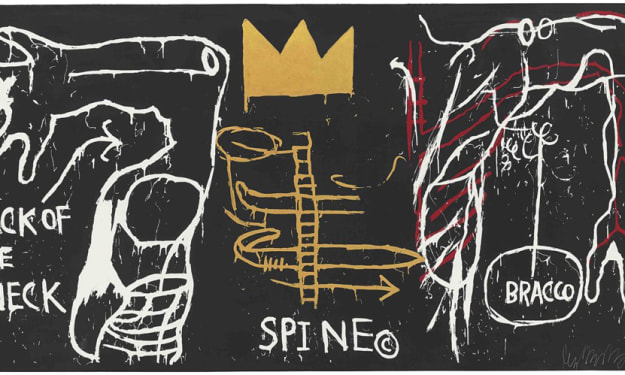The Marble
I used to write to stomach lies; now I write to savor truths

When discussing habit and addiction in the human mind, it can be helpful to think of one’s entire brain as a marble course. Your mind is the marble, rolling down an endless expanse of possibility. Where will the object go? The object will always go where it is easiest to go. Sometimes this changes when new variables are added into the equation, and sometimes it remains the same. Think of a marble rolling down a course; if there is a downward slope, eventually gravity will draw the marble in that direction. But the added variable of a plastic blockade, or a finger exerting force in the opposite direction; well these are liable to change things, most importantly the decision at the end of the day that all of these calculations attempt to count toward: where is it easiest to go?
In the mind this basic principle plays out in the form of habit or addiction. If one tries to observe oneself, as objectively as possible (understanding bias is unavoidable), one can see that the person, much like the object, always makes the easiest decision. Remember though, that many variables are on the table. One of the most essential, is the amount of times one has done something before. Think of a piece of driftwood or a stalagmite. In both of these cases, we can observe an object coming into contact with water, and gradually becoming shaped and smoothened by that interaction. Over time, if a worm with delicate skin were to crawl its way over driftwood, or a stalagmite, we would see if we measured it, that the worm would have an easier time the longer this process of change between the water and the surface had occurred. You can also think of dragging a delicate part of one’s body over a surface, like that of driftwood, or a stalagmite (bear with me). Would this be easier when the wood first made its way into the water, or after it had spent significant time in the sea? Would this cause less pain if it were the rough sedimentary floor of a cave, or the smoothened surface of a stalagmite which had been growing for a thousand years? The mind is the same way. The longer this erosion on the part of habit has gone on, the easier it will be for the marble to slip down the slope in that direction, and some force is always creating a slope for the marble, and these slopes often point in many directions. Ultimately though, one direction, one slope, becomes most sensible; and then a decision is made.
This always plays out in the decision; what should I do right now? We are always asking ourselves this question, we never stop; but sometimes the decision is so immediate, and the path in that direction is so smoothened by habit or instinct, that it feels like no decision at all. But other times when we are bored, lying in bed with no immediate responsibilities at 5 pm on a Tuesday, the question of how to occupy ourselves becomes preeminent, and the time it takes our mind to make this decision, or rather to perceive that we make it, can often be quite long (relatively). One for example, might wonder if it would be better to do homework or to masturbate. On the one hand there is the responsibility of education, and the mandate of shame in industrial societies, of finishing whatever task is assigned to you. The homework might often be interesting, and might activate parts of your brain that are nostalgic, or fascinated by tree frogs, or proud of yourself for doing what you perceive to be right. Another part of your brain might have the instinct to touch yourself. Or perhaps you’re tired and you had a shitty day, and masturbating would simply, oh well it would be easier wouldn’t it. But why? Because it is the path that has been most smoothened; at that moment, at that context, with that level of data and experience of the world. There are many in the world who for example, may have done significantly more homework than masturbation. Why? Well maybe their relationship with their mother required it, and it was easier to complete the homework than explain why it was not complete, or face the consequences of its incompletion. Or maybe school was the most nourishing part of their day, and in order to enable opportunities there, the easiest thing to do was to earn a high GPA. Perhaps as well, there are people who have severe trauma from events in their lives (perhaps most of them), which cause masturbation to activate shame, painful memories, or feelings that make them feel in danger in some way, for some reason. In cases like this, and in many others for different reasons, masturbation is simply not the easiest decision, or the one that causes the least friction. The marble always rolls in the direction where there is the least friction. Though, perhaps friction is not the most suitable word, despite being the easiest. Because friction is often used to refer to things like sticks rubbing together, or files moving over nails, not things like wrecking balls or Megalodon bites. Ultimately though, the thing that friction and all of its synonyms refer to is force, and force is the next variable that must be discussed.
You are the force on your mind. Whatever you think you are, whatever thing, or field, or face you would see and refer to as you, that is the force that is active on your mind. Sometimes, if a mandate is discovered, you will be the one to poke the marble in the direction opposite to the one that it’s drawn to by gravity. You will be the force, greater than the downward slope that pulls it, that pushes the marble in a new direction and each time it moves over a new path more than once, it becomes easier to move along that path again. Whether the possibilities of this force are finite or infinite is a matter which I think should be up for discussion. Through self belief, clarity, and discipline are you ultimately able to breach any other force and any other variable acting upon the marble of your mind? Sometimes I think so. But then I realize that my ability to exist in any state, at any time, whether one of enlightenment or one of psychological destitution, is always affected by variables that exist outside of my own body. Will my city be bombed today? Will my mother make the decision to take a job at twenty five, so at thirty one she has enough money saved for a down payment on an apartment, so that during nine eleven we are staying at a small two bedroom in Brooklyn, rather than taking a walk outside the towers? All of these are decisions that shape people’s lives in every way, and so understanding the mechanics of them is incredibly useful.






Comments
There are no comments for this story
Be the first to respond and start the conversation.